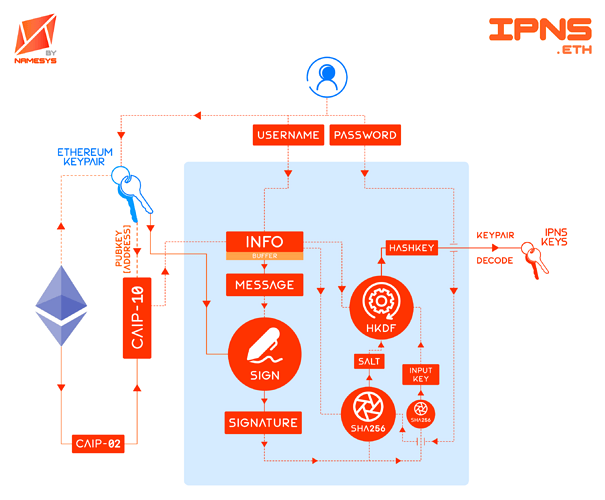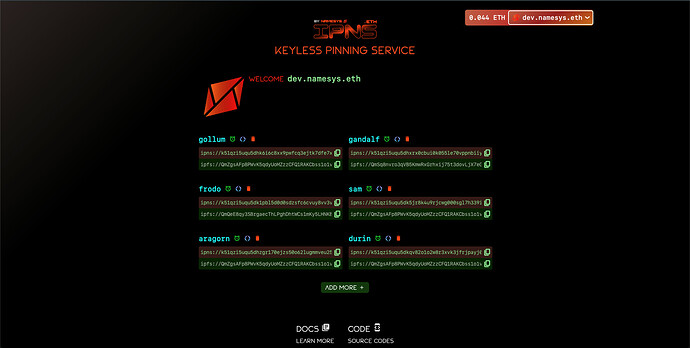IPNS.eth: Keyless Pinning Service
Pin Content to IPNS Trustlessly and Securely!
Clients: ipns.eth | ipns.dev | pin.namesys.xyz
Abstract
IPNS.eth is a no-nonsense, free, open-source, autonomous, trustless, keyless and secure IPNS Pinning Service. Users of IPNS.eth do not need to share their IPNS keys with service providers, and can securely and ‘keylessly’ publish to IPFS network with anonymity. To our knowledge, this is the first such service and public good in existence.
Motivation
It’s autonomous, trustless, keyless and secure, and it is the first of its kind. Users of IPNS have so far required to either share their private keys with service providers such as 1W3.io or dWebServices.xyz, or publish privately from their IPFS nodes. IPNS.eth is the first service which removes this severe security flaw and accessibility issue by employing a “keyless” interface to the IPFS network. Users’ IPNS keys are generated deterministically from their Ethereum wallet signatures only during an update, and the content is then pinned and published on NameSys’s fork of w3name publishing infrastructure deployed on Cloudflare.
Showcase
Specification
a) Keyname
keyname is an identifier for an IPNS key, such that
let keyname = 'keyname'
b) Password
password is an optional string value used to salt the key derivation function (HKDF),
let password = "horse staple battery"
c) Chain-agnostic Identifiers
Chain-agnostic CAIP-02: Blockchain ID Specification and CAIP-10: Account ID Specification schemes are used to generate blockchain and address identifiers caip02 and caip10 respectively,
let caip02 =
`eip155:<EVM_CHAINID>` ||
`cosmos:<HUB_ID_NAME>` ||
`bip122:<16BYTE_HASH>`;
let caip10 = `${caip02}:<ADDR_CHECKSUM>`;
d) Info
info is CAIP-10 and Keyname string formatted as:
let info = `${caip10}:${keyname}`;
e) Message
Deterministic message to be signed by the wallet provider,
let message = `Requesting Signature To Generate IPNS Key\n\nOrigin: ${keyname}\nKey Type: ed25519\nExtradata: ${extradata}\nSigned By: ${caip10}`
such that
// EXTRADATA
bytes32 extradata = keccak256(
abi.encodePacked(
keccak256(
abi.encodePacked(password)
),
ETH_ADDR_CHECKSUM
)
);
f) Signature
RFC-6979 compatible (ECDSA) deterministic signature calculated by the wallet provider using native keypair,
let signature = wallet.signMessage(message);
g) Salt
salt is SHA-256 hash of the info, optional password and last 32 bytes of signature string formatted as:
let salt = await sha256(`${info}:${password?password:""}:${signature.slice(68)}`);
where, signature.slice(68) are the last 32 bytes of the deterministic ECDSA-derived Ethereum signature.
h) Key Derivation Function (KDF)
HMAC-Based KDF hkdf(sha256, inputKey, salt, info, dkLen = 42) is used to derive the 42 bytes long hashkey with inputs,
-
inputKeyis SHA-256 hash of signature bytes,let inputKey = await sha256(hexToBytes(signature.slice(2))); -
infois same as defined before, i.e.let info = `${caip10}:${keyname}`; -
saltis same as defined before, i.e.let salt = await sha256(`${info}:${password?password:""}:${signature.slice(68)}`); -
dkLen(Derived Key Length) is set to42,let dkLen = 42;FIPS 186-4 B.4.1 requires hashkey length to be
>= n + 8, wheren = 32is the bytelength of the finaled25519private key, such that42 >= 32 + 8. -
hashToPrivateScalar()function is FIPS 186-4 B.4.1 implementation to convert HKDF-derived hashkey to valided25519keypair. This function is implemented in JavaScript library@noble/ed25519ashashToPrivateScalar().let hashKey = hkdf(sha256, inputKey, salt, info, dkLen = 42); let privKey = ed25519.utils.hashToPrivateScalar(hashKey); let pubKey = ed25519.utils.getPublicKey(privKey);The resulting
privKeyandpubKeyis theed25519deterministic keypair that can interact with IPFS network.
Implementation Requirements
-
Connected Ethereum wallet Signer MUST be EIP-191 and RFC-6979 compatible.
-
The
messageMUST be string formatted asRequesting Signature To Generate IPNS Key\n\nOrigin: ${keyname}\nKey Type: ed25519\nExtradata: ${extradata}\nSigned By: ${caip10} -
HKDF
inputKeyMUST be generated as the SHA-256 hash of 65 bytes long signature. -
HKDF
saltMUST be generated as SHA-256 hash of string${info}:${password?password:""}:${signature.slice(68)} -
HKDF Derived Key Length (
dkLen) MUST be 42. -
HKDF
infoMUST be string formatted as${caip10}:${keyname}
TS Example
import * as ed25519 from '@noble/ed25519'
import {hkdf} from '@noble/hashes/hkdf'
import {sha256} from '@noble/hashes/sha256'
import {ethers} from 'ethers'
let wallet = new ethers.Wallet(PRIVATE_KEY, provider)
let keyname = "keyname"
let chainId = wallet.getChainId(); // Get ChainID from connected wallet
let address = wallet.getAddress(); // Get Address from wallet
let caip10 = `eip155:${chainId}:${address}`;
let message = `Requesting Signature To Generate IPNS Key\n\nOrigin: ${keyname}\nKey Type: ed25519\nExtradata: ${extradata}\nSigned By: ${caip10}`
let signature = wallet.signMessage(message); // Request Signature from wallet
let password = "horse staple battery"
/**
* @param keyname Key identifier
* @param caip10 CAIP identifier for the blockchain account
* @param signature Deterministic signature from X-wallet provider
* @param password Optional password
* @returns Deterministic private/public keypairs as hex strings
* Hex-encoded
* [ed25519.priv, ed25519.pub]
*/
export async function KEYGEN(
keyname: string,
caip10: string,
signature: string,
password: string | undefined
): Promise<[
string, string
]> {
if (signature.length < 64)
throw new Error('SIGNATURE TOO SHORT; LENGTH SHOULD BE 65 BYTES')
let inputKey = sha256(
ed25519.utils.hexToBytes(
signature.toLowerCase().startsWith('0x') ? signature.slice(2) : signature
)
)
let info = `${caip10}:${keyname}`
let salt = sha256(`${info}:${password ? password : ''}:${signature.slice(-64)}`)
let hashKey = hkdf(sha256, inputKey, salt, info, 42)
let ed25519priv = ed25519.utils.hashToPrivateScalar(hashKey).toString(16).padStart(64, "0") // ed25519 Private Key
let ed25519pub = ed25519.utils.bytesToHex(await ed25519.getPublicKey(ed25519priv)) // ed25519 Public Key
return [ // Hex-encoded [ed25519.priv, ed25519.pub]
ed25519priv, ed25519pub
]
}
Security Considerations
- Users SHOULD always verify the integrity and authenticity of their client before signing the message.
- Users SHOULD ensure that they only input their
keynameandpasswordin trusted and secure clients.
References
- RFC-6979: Deterministic Usage of the DSA and ECDSA
- RFC-5869: HKDF (HMAC-based Extract-and-Expand Key Derivation Function)
- CAIP-02: Blockchain ID Specification
- CAIP-10: Account ID Specification
- Digital Signature Standard (DSS), FIPS 186-4 B.4.1
- ERC-191: Signed Data Standard
- EIP-155: Simple Replay Attack Protection
- ECDSA Signature Standard
- @noble/hashes
- @noble/secp256k1



